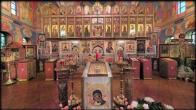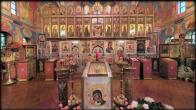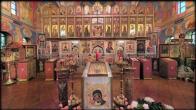You are here
A Church's 60-year Long Path
(On the 60th Anniversary of the Parish)
Among the parishioners of Washington ’s Cathedral of St. John the Baptist, there are still people who 60 years ago laid its foundation, and were among the first to participate in its Divine Services. They remember well the beginning of this church’s journey. One particular individual always stands unobtrusively in the same place during the Sunday services, and quite possibly, many who are standing near him have no idea that he is the very personification of the many-year history of this church. One hopes that Adam Ivanovitch will share his reminiscences in the pages of this publication. In my opinion, this is something especially important for those who come here in the future...
The first parishioners of the Cathedral of St. John the Baptist in the post-war years were first and second wave immigrants. I suppose that even now, they, their children and grandchildren, form its core, despite the fact that today one may encounter here representatives of all four waves of Russian emigration. The first two waves began after the First and Second World Wars, and were in the main, political emigrants, refugees. In both, the majority were ethnic Russians. The third and fourth waves consisted of various population groups from the former USSR . However, along with them there also came – as relatives – ethnic Russians who wanted to preserve abroad not only their Russian language and culture, but also their ancestral Faith. Like the emigrants of the third wave, which is also known as a predominantly Jewish wave, the [Russians] who came in those years can freely return to Russia or to the other post-Soviet republics, can keep their apartments there, and if they wish, can have dual citizenship. Finding themselves for extended periods outside their historical homelands, many come to churches of the Russian Church Abroad, because for Russian émigrés, the Church is both a religious and a social center. United by the common problems of life in a foreign country, people get to know each other, and try to help one another. This is evident now as well, in a period of world financial crisis that has affected all levels of American society. Prominent among the email parish news announcements distributed to parishioners by the Parish Rector, Archpriest Victor Potapov, are appeals from those who have lost their jobs in these times that are so difficult for everyone. Less often, but at times, there are notices offering employment positions to others. Parishioners thus can immediately have information about those in need of work and those who need workers.
For several years in succession, I have made annual trips from my home in Belarus . Whenever I have come to this church, I feel at home. The feeling is strengthened by Fr. Victor’s homilies, given in contemporary Russian, and by fellowship with parishioners, many of whom understand quite well the basic vicissitudes in our common Homeland’s history. Whenever, at lunch in the Parish Hall, I hear Professor Parfeny Pavlovitch Zavorotnov’s disputations with his friends, I am constantly amazed at how deeply our compatriots abroad take to heart the events taking place in the post-Soviet republics, how they know all of the politicians and cultural figures, how they quote verses not only from the Russian classics but from contemporary poets. After all, many of them were born here, or left Russia five or six decades ago. Most of our compatriots abroad have not only preserved, but have passed on to their children and grandchildren the Holy Orthodox Faith, love of Russian culture, together with its great Russian language.
Under the church arches, the Slavonic choir, directed by Yuriy Pecherkin, chants in beautiful harmony. Many in the choir were professional musicians in the former Soviet Union . One of them is Inna Pecherkin, a compatriot of mine (and wife of the choir director), who always radiates optimism and friendliness. She was educated at the Moscow Conservatory, where she met Siberian Yuriy Pecherkin. To continue on the subject of compatriots (a theme that of course is especially attractive to me), a few days after I came to the church, Marina Vernigora (then head of the Sisterhood) on learning that I was from Belarus, gave me a warm welcome. Marina ’s ancestral roots are in a little town in Grodno Oblast’, in the Western part of the Republic. Marina dreams of going to Belarus , to see with her own eyes the places where her grandparents were born, and to search the old archives for information about her relatives. By the way, Marina Petrovna is from a priestly family.
I unintentionally came to witness how difficult it was for our brothers and sisters in the faith who were abroad to recognize the importance of union with the Church in Russia . Many of those who had sharply felt the pain of separation from their native land, betrayal, offense, and loss of loved ones in the Homeland, did not immediately accept and support the idea of unification. All the more treasured and important were my encounters and talks with Svetlana Mikhailovna Newman, a parishioner who has been trying not to miss any Divine Services here for almost 50 years. She relates that when she first came here, the church was housed in a building that resembled an ordinary dwelling. Through the efforts and material support of the parishioners of that time, people who today are remembered with feelings of thanks, year by year it came to look more and more like a church. We often spoke with Svetlana Mikhailovna on the subject of unification. I cannot remember ever hearing a word of haughty criticism, pretentiousness, or sermonizing from the intellectual with whom I was conversing. Whenever I interviewed people in Minsk , I always imagined that our compatriots abroad were highly educated and sincere people like her. I got the impression that despite all of the difficulties and trials which she had had to endure, Svetlana Mikhailovna continues to consider herself a part of the Russian people. And despite the fact that her childhood and youth were spent separated from the Homeland, she was sincerely happy that the two parts of one single Church have been united, understanding that this event had been something particularly eagerly awaited by those living in Russia .
I remember the stormy parish meeting that discussed the issue of Unification. (As a journalist, I try not to miss any of them, especially since here they are conducted in the open, where anyone who wants to can participate). I tried to grasp, to understand, the arguments of those who were categorically opposed. As I understood them, everything came down to the fear that Moscow would take control of property that the parishioners, often people who were in a foreign land not by choice, had established literally with their sweat and blood. People who live in the former Soviet Union, most of whom have never been outside the borders of their land, still believe that in the USA , people live in fairy-tale luxury, without exerting much effort, or as we say, “manna falls from Heaven right into their mouths.” Many cannot even imagine what it is like to find yourself in a foreign land, with little suitcases containing the barest of essentials, without material resources, without knowing the language (conditions endured by the majority of those who emigrated in the Soviet era), but to nonetheless survive, endure, and find oneself, find one’s place in conditions of sharp and constant competition. It is only now that I understand why Soviet society was in a state of “stagnation” instead of developing normally with such available natural resources. Undoubtedly, one of the reasons was the absence of competition.
Although this American parish today has great plans for reconstruction of its church (there is a frank lack of space: 250 regularly attending parish members, and certainly almost as many who attend on Great Feasts), charitable activities remain the principal distinguishing characteristic of the Orthodox Church abroad. Almost one half of Rector Fr. Victor Potapov’s annual report is a recitation of assistance rendered, and words of thanks to those who took part in rendering that assistance. First and foremost aid flows from the Washington church to the most varied corners of Russia , Belarus , Ukraine and other post-Soviet republics. Often, parishes in other states in America , and many other countries, turn here for help. Examples? Substantial funds were collected and sent toward the construction of the Holy Ascension Church in Zhanovitch (near Minsk , capital of Belarus ), which, by the way, is modeled after the Cathedral of Holy Trinity Monastery in Jordanville. [The parishioners] reacted with kindness and sympathy to the fate of a certain solitary 70 year old woman from Minsk , who as the result of a terrible accident found herself restricted to her bed. Her pension in Belarus was only enough to provide for the most basic of living expenses. Material aid was given so that she might have an operation on her fractured hip. Here in America , it is even hard to imagine how grateful, how thankful Larisa Dmitrievna (now no longer with us), a solitary woman was to strangers who had unexpectedly come to her aid in such a difficult time in her life. Naturally, the first examples that come to mind are those with Belarus addresses. They are fresh in my memory, for they form a spiritual bridge between my fellow Belorussian citizens and the Orthodox faithful in Washington . If one were to gauge the geographic distribution of help [rendered by this parish] by the letters of thanks coming to this church, it would be almost the entire planet. Here are some additional facts from Fr. Victor’s annual report: Funds were collected for, and sent out to, the Monastery of St. Chariton in Palestine , to the Orthodox mission in Indonesia , to the Holy Trinity Seminary in Jordanville, and to the St. Herman Youth Conference that took place in Jackson , New Jersey . Financial aid was rendered to an orphanage in Kostroma , to children’s hospitals in Moscow and St. Petersburg , and to the Russian Children’s Fund. Resources were allocated for the building of a therapeutic center for the victims of the terrorist act in Beslan, and also to the first Orthodox women’s monastery in Ossetia . One could go on with the list, for the collection of funds for charitable activities is constantly ongoing. Quite recently, as a consequence of the swine flu (H1N1) epidemic, which began in Mexico , one of the Orthodox parishes in that country likewise turned to the Washington church for help. The Rector, Fr. Victor, always thanks the parishioners for their active willingness to help the needy and less fortunate brothers and sisters in Christ. I remember the case of a young man from Belarus who perished in a tragic incident in New York . Fr. Victor appealed to everyone to help collect money to pay for shipping the body of the young man to his homeland for burial; the young man’s parents, who lived in a village in Belarus wanted to bury their son in their homeland, but did not have enough funds to accomplish that.
Valentina Nevsorova, member of the Belarus Union of Journalists, 2009
PARISH LIFE
RECENT VIDEOS
Address of our Cathedral
Subscribe to our mailing list
While all the materials on this site are copyrighted, you may use them freely as long as you treat them
with respect and provide attribution on the Russian Orthodox Cathedral of St.John the Baptist of Washington DC.









